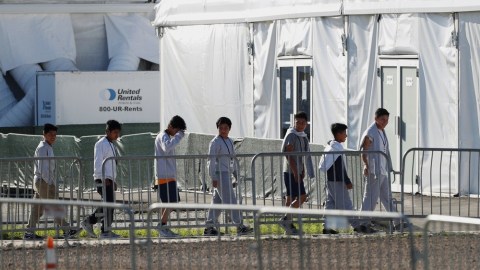Central Florida could be a potential location for a permanent shelter to host migrant children

AP Photo/Wilfredo Lee
- A letter from the U.S. Department of Health and Human Services is scouting out locations for a permanent shelter.
- With an influx of migrant children and public outcry on their living conditions, this may be their solution.
- It is not clear whether or not the permanent shelter will ever be built.
According to a recent email sent to state legislature from the U.S. Department of Health and Human Services (HHS), the Trump administration is exploring options to open a permanent shelter, prospectively in Central Florida, to hold migrant children detained at the border.
A majority of Democratic lawmakers and activists oppose the idea. As Florida’s Democratic Florida Rep. Anna Eskamani tweeted, “We should be closing camps, not opening new ones.”
The HHS intends to search existing vacant properties in an attempt to create permanent sites and minimize the need for temporary detention centers. They feel that this would be an adequate way to address the increasingly chaotic and unpredictable situation at the border.
At one point the letter states, “Due to the crisis on the southern border, [the Office of Refugee Resettlement (ORR)] has seen a dramatic increase in referrals of (unaccompanied children) from the U.S. Department of Homeland Security this Fiscal Year and continues to operate in emergency influx mode. The search for an addition of permanent licensed facilities is being pursued to reduce the potential need for temporary influx shelters in the future.”
Proposed facilities
The government agency’s intention is to lease properties and then build them out to state and federal code as permanent shelters. Migrants would be expected to move in as soon as spring of 2020.
So far there hasn’t been any specifics given to the location in Central Florida. Governor Ron DeSantis has been made aware of the plan. Although his spokeswoman, Helen Ferre confirmed to the Orlando Sentinel, that the search was exploratory in nature:
“The federal government has indicated it is initiating an exploratory process. If and when the federal government has a specific proposal for the state to consider, it will be addressed.”
She did not confirm whether or not the governor supported building a permanent shelter in the state. The plan has also previously been publicly denounced by Trump, who stated that he did not approve such a measure. Even with this contradictory stance, it seems that search has still gone on.
About six months ago, Glen Casel, CEO of the nonprofit Embrace Families, said that he, alongside other children’s services providers, were contacted and asked by the HHS if they’d be able to supply a shelter to house migrant children.
Casel told them that it wasn’t something of interest to them and not a good fit with their organization. Yet, he reportedly suspects others didn’t turn the HHS down:
“. . . but many in our provider network were interested, and I know they followed up. I think we all felt like we wanted to help those children, but it’s a political hot button, these are difficult cases and there are language and cultural barriers you have to overcome.”
Reaction from officials and activists
Currently, the largest migrant housing facility is based in Homestead, Florida, where many critics, immigration activists, and lawyers who have sued the government have described the place as having prison-like conditions. Recently migrant children were removed from the facility.
The HHS letter explains that the new complex would be a permanent shelter and would be much different than other detention camps that have sparked the ire from activists.
Perhaps, the reason for this new potential facility could be due to the many concerns over the last year that children were in “cages” and unsafe environments not up to code.
No specifics regarding the plan have been released yet, though. One of the agency’s fact sheets stated that the Department of Homeland Security (DHS) has already referred more than 58,500 “Unaccompanied Alien Children” to the ORR. This constitutes a 57 percent increase over the same time period as last year in 2018.
United States Rep. Darren Soto, D-Kissimmee, felt that it was a shame that it had to come to this. “The Trump administration should be focused on reuniting these children with their families here in the United States.”
Sister Ann Kendrick, another activist was worried that there could be a conflict of interest in building a facility such as this. “To build a permanent facility is an indication of what the long-term strategy will be,” Kendrick stated. “It would be interesting to know who is going to own this facility. Is it the federal government or one of their contract relationships with the private prison industry, which is making a lot of money off this market of suffering immigrant people, especially children? Which is just wrong, wrong, wrong.”
A permanent shelter would be state licensed and controlled under the department’s Office of Refugee Resettlement. Once the buildings met all necessary licensure requirements, a service provider would operate the facilities.





